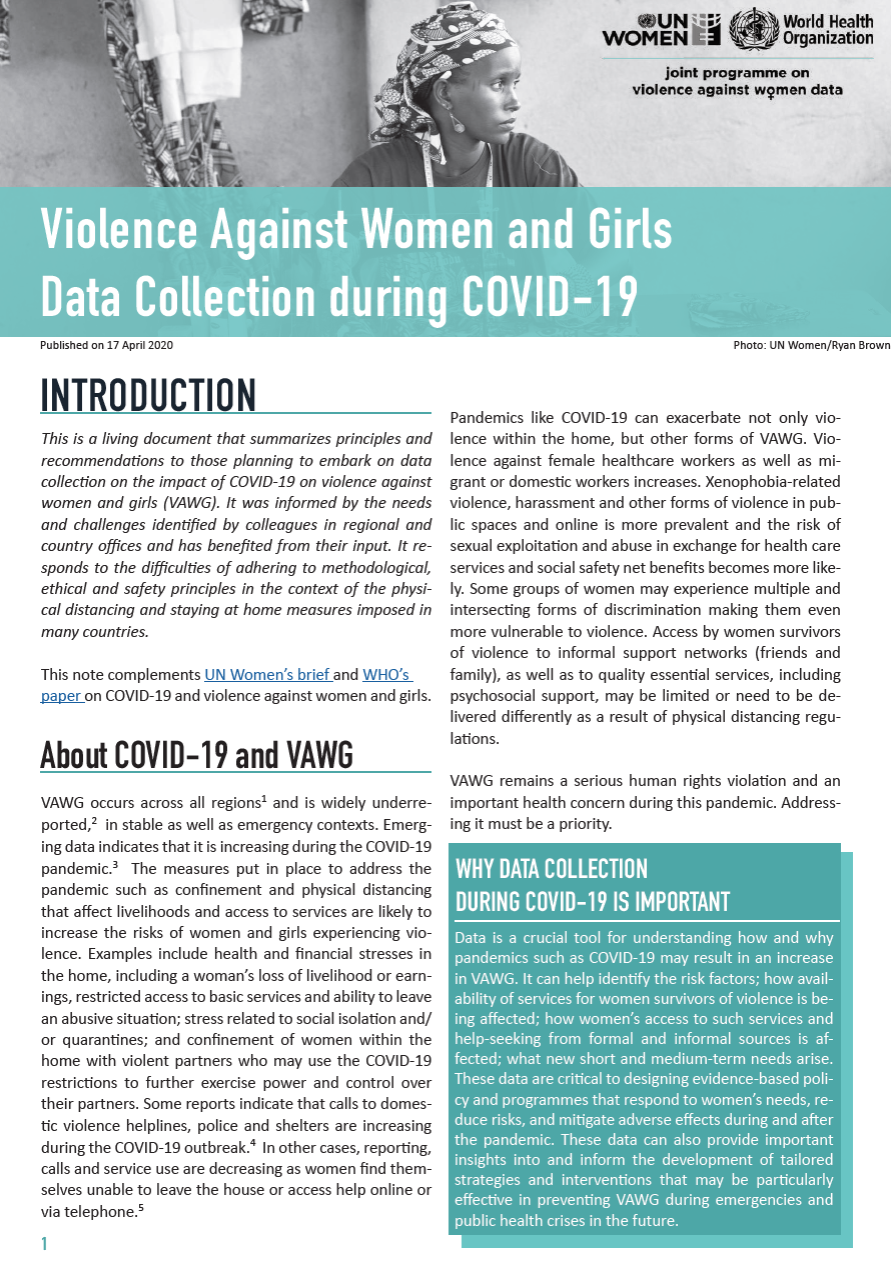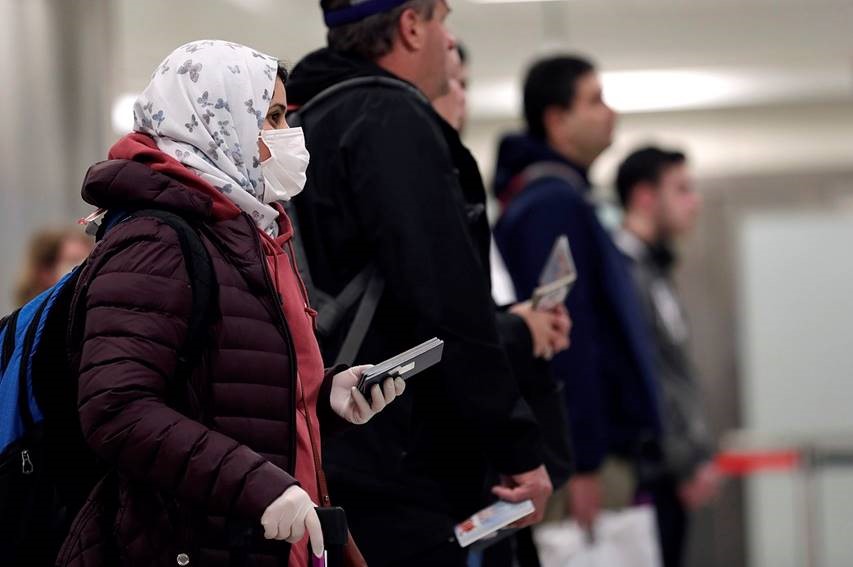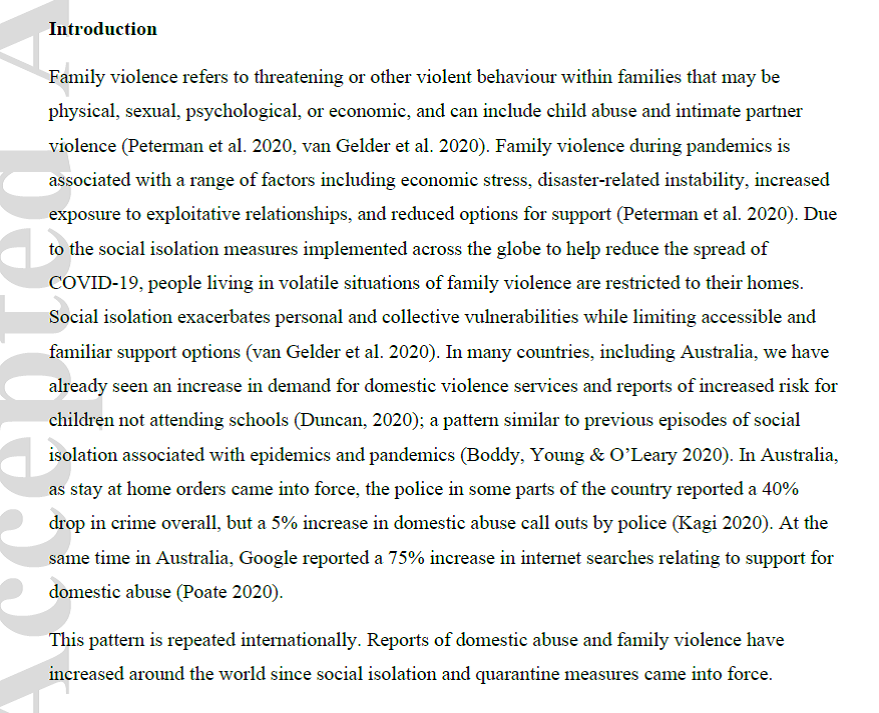Violence against women and girls data collection during COVID-19
This brief paper summarizes principles and recommendations to those planning to embark on data collection on the impact of COVID-19 on violence against women and girls. It was informed by the needs and challenges identified by colleagues in regional and country offices and has benefited from their input. It responds to the difficulties to adhere to methodological, ethical and safety principles in the context of the physical distancing and staying at home measures imposed in many countries.
This document was developed under the UN Women-WHO Global Joint Programme “Strengthening methodologies and measurement and building national capacities for violence against women data”. The paper complements the UN Women’s brief “COVID-19 and violence against women and girls” and WHO’s paper “COVID-19 and violence against women”

To View or Download Full Document the link is Below:
Publication in full (PDF, 464KB)
—————————————————————————————————————————————–
Resourcing Resilience Grant
GRANT CRITERIA
- Women or Non-Binary Led – women or non-binary human rights defenders must be the primary beneficiaries of the grant, preferably channelled via a women’s rights organisation;
- Human Rights Focus – the organisation promotes the advancement of women’s and/or LBTQI’s human rights using nonviolent tactics or strategies and upholds the universality of human rights;
- Strategic Intervention – the grant requested is earmarked for an intervention that responds to unfolding situations or unanticipated opportunities for the protection and support of women and non-binary defenders. It may also be a bold, strategic, creative or innovative in a way that expands current approaches of resourcing resilience for women’s human rights and human rights activism;
- Time-bound – the proposed initiative must be implemented within 3 months of approval of an application and completed within 6 months thereafter;
- Supported or Networked – the defender or the organisation has the support of others involved in women’s human rights, sexual rights or related fields of human rights at local or national level.
MAXIMUM AMOUNT OF GRANT
UAF A&P provides grants of up to USD $5,000 only. Subsequent applications from the same defender or organisation will be considered on a case-by-case basis.
WE DO NOT FUND
- Cisgender males or Cisgender male-led organisations or network;
- Individual requests without endorsement by an organisation, established community or established network affiliation or a UAF A&P advisor;
- Activities or projects for humanitarian crises or natural disasters;
- Activities or projects focused on development aid or charity assistance;
- Projects or activities that are part of the regular programmes of an organisation;
- Regular operating budgets and/or bridge funding (to fill a funding gap).
Apply HERE or Download the application HERE
For grant inquiries email us at grants@uafanp.org
Note:
1. The application must meet all of the following criteria.
2. Non-binary is an umbrella term referring to individuals whose gender identity and/or gender expression are not exclusively masculine or feminine, male or female — thus, are outside of the gender binary and cisnormativity. UAF AP uses this term to encompass androgyny, polygender, genderqueer, gender fluid and a-gender individuals.
3. Cisgender Males are individuals who identify as male and who were assigned male at birth
—————————————————————————————————————————————–
Principles for Protecting Civil & Political Rights in the Fight against COVID-19

International travelers wait in line before meeting with U.S. Customs and Border Protection Office of Field Operations officers at the airport amid the coronavirus pandemic. Via Wikimedia Commons
The Covid-19 pandemic presents a grave threat to public health, but emergency measures adopted to combat the dangers can also have discriminatory impacts and harmful effects, and can be extended and repurposed after a crisis has passed. Freedom House calls on governments to protect civil and political rights during and after the pandemic by following these principles:
- Any emergency restrictions should be clearly communicated, enacted in a transparent manner, well grounded in law, necessary to serve a legitimate purpose, and proportionate to the threat.
- Emergency restrictions affecting basic rights, including freedoms of assembly, association, or internal movement, should be limited in duration, subject to independent oversight, and imposed and extended based only on transparent criteria. Individuals should have the opportunity to seek remedies and compensation for any unnecessary or disproportionate rights violations committed during the crisis.
- New or expanded surveillance programs that use emerging technologies or collect individuals’ personal information, including that obtained from private companies, must be administered in an open and transparent manner, scientifically necessary to limit the spread of disease, limited in duration, subject to independent oversight, and “firewalled” from other commercial and governmental uses such as law enforcement and enforcement of immigration policies.
- A free press is especially vital during times of emergency. There should be no state censorship or other undue restrictions on the free flow of information. All efforts must be made to provide and maintain access to the internet and other communication platforms. Criminal penalties for distributing false information are disproportionate and prone to arbitrary application and abuse. Instead, governments should counter any falsehoods by delivering clear, accurate, and up-to-date information.
- Every feasible step should be taken to protect the administration of free and fair elections, including by adjusting voter-registration rules and polling-station procedures, encouraging early voting, and allowing vote-by-mail or other remote voting procedures where their integrity can be assured. Postponement of elections should only be a last resort, and should be supported by law and a broad consensus among political forces and independent experts.
Source:
https://freedomhouse.org/article/principles-protecting-civil-and-political-rights-fight-against-covid-19
—————————————————————————————————————————————–
Family Violence & COVID19: Increased Vulnerability & Reduced Options for Support

 Safety and Risk Mitigation Organization Safety and Risk Mitigation Organization
Safety and Risk Mitigation Organization Safety and Risk Mitigation Organization